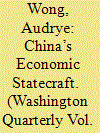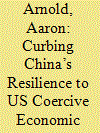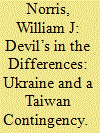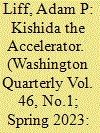|
|
|
Sort Order |
|
|
|
Items / Page
|
|
|
|
|
|
|
| Srl | Item |
| 1 |
ID:
190377


|
|
|
|
|
| Summary/Abstract |
Economic statecraft has become an increasingly prominent part of China’s foreign policy toolkit. Beijing has often sought to use both economic coercion and inducements to achieve its political goals, albeit to mixed results. In that vein, Chinese leaders have attentively watched how the United States has deployed its economic power, including US-led sanctions on Russia following the invasion of Ukraine. This recent episode has underscored America’s continued global financial power and highlighted to Beijing its potential economic vulnerabilities, as well as the risks of international opprobrium. At the same time, Washington faces challenges in assembling a durable global coalition to exert pressure on Moscow, due to economic dependencies on Russian energy and political reticence outside of a core bloc of allies.
|
|
|
|
|
|
|
|
|
|
|
|
|
|
|
|
| 2 |
ID:
190379


|
|
|
|
|
| Summary/Abstract |
It has been a year since Russia’s invasion of Ukraine and the West’s subsequent response with coordinated financial and economic sanctions. It was not only Moscow, however, that was caught off-guard by Washington’s unprecedented speed at leveraging not only its own sanctions regime, but also coordinating with its partners and allies. Beijing, too, was equally unnerved by how quickly and how extensively the sanctions regime against Russia unfolded. What lessons, then, might China take away from US-led sanctions against Russia? Can China feasibly fortify its financial and economic system against the potential for a large-scale, coordinated sanctions effort?
|
|
|
|
|
|
|
|
|
|
|
|
|
|
|
|
| 3 |
ID:
190378


|
|
|
|
|
| Summary/Abstract |
When and if a Taiwan contingency were to ever unfold, there is likely to be a natural tendency to refer to the Ukraine experience as a reference from which to draw strategic lessons. While there are some structural similarities between the Ukraine war and some future Taiwan scenario—and certain preferences and courses of action may look familiar—attention ought to be more focused on areas in which they diverge. Drawing on US economic statecraft responses to the Russian invasion of Ukraine, I suggest that a Taiwan contingency may prove more challenging, and that parts of the US government should proactively take measures today to enhance our position in any future conflict involving Taiwan. Across the more than 30 departments and agencies in the US government that are responsible for some element of economic statecraft, there is a pressing institutional need to engage in economic statecraft capacity building. Economic statecraft takes on a wide variety of forms well beyond sanctions. We need to improve both our understanding of economic statecraft as well as our institutional capacity to wield this important tool of national power. The time to do that is now, not in the middle of an acute crisis.
|
|
|
|
|
|
|
|
|
|
|
|
|
|
|
|
| 4 |
ID:
190373


|
|
|
|
|
| Summary/Abstract |
During his first speech following a run-off victory over far-right Brazilian incumbent Jair Bolsonaro on October 30, 2022, Luiz Inácio Lula da Silva characterized his understanding of democracy “not only as a beautiful word, written in the law, but something actually tangible, which we can feel touching our skin and collectively build on an everyday basis.”Footnote1 With this, the former labor union leader and president of two terms (2003-2010), who was jailed from 2018-2020 and later released after being cleared of corruption charges, sought to signal to Brazil and the world that his incoming government would, above all, address the nation’s demand for egalitarian economic development driven by popular participation. By implication, this entails pursuing a foreign policy that attracts foreign investment to generate jobs in high-added value sectors, a first step in reducing dependence on commodity exporting. What are the implications of such goals for Brazil’s foreign policy, and for the country’s comeback after four years of Bolsonaro’s Trumpian anti-multilateralism and isolationism?
|
|
|
|
|
|
|
|
|
|
|
|
|
|
|
|
| 5 |
ID:
190371


|
|
|
|
|
| Summary/Abstract |
Long-term changes propelled by the clean-energy transition—in the distribution of geopolitical power, the meaning of sustainable energy consumption, and the scope and character of interdependence—are transforming the global energy order. Dependence on new critical materials and metals—such as chromium, copper, germanium and lithium, all essential inputs for many clean energy technologies—reflects new patterns of asymmetrical interdependence and calls into question some of our assumptions about oil and gas as strategic goods. Among these changes, the critical materials at the heart of the clean energy transition are infusing the geopolitics of energy with new meaning: the rise of renewables is undermining Russia’s position as an “energy superpower” at the precise moment that its relationship with Europe is being reshaped by its invasion of Ukraine.Footnote
|
|
|
|
|
|
|
|
|
|
|
|
|
|
|
|
| 6 |
ID:
190375


|
|
|
|
|
| Summary/Abstract |
In December 2022, Japan defined its security policy for the coming decade by releasing three documents: a National Security Strategy, a National Defense Strategy, and a Defense Buildup Program. This long-anticipated set of documents have proven to be transformational by bringing about significant and positive changes in the US-Japan alliance.Footnote1 The past decade has been a critical—and evolutionary—juncture in Tokyo’s security policy.Footnote2 The series of security reforms implemented throughout the decade have paved the way to facilitate a more integrated military alliance with the United States by bolstering Tokyo’s decision-making apparatus and untangling some of the peculiar legal constraints on the use of force in Japan.Footnote
|
|
|
|
|
|
|
|
|
|
|
|
|
|
|
|
| 7 |
ID:
190374


|
|
|
|
|
| Summary/Abstract |
Japanese Prime Minister Fumio Kishida’s January 2023 summit with President Biden capped one of the most significant months for Japanese defense policy in decades. On December 16, Kishida’s government announced a strikingly ambitious revision of Japan’s national security strategy—the first since 2013. Part of a package of three major security documents also including Japan’s new national defense strategy and defense buildup plan, last December’s announcements are as remarkable for the substantive ambition and breadth of the pledges contained within as for what they reveal about rapidly worsening concerns in Japan about regional and global geopolitical and geo-economic trends.
|
|
|
|
|
|
|
|
|
|
|
|
|
|
|
|
| 8 |
ID:
190376


|
|
|
|
|
| Summary/Abstract |
Government actors and other observers across Europe and the United States called the multilateral sanctions imposed on Russia in early 2022 “unprecedented.”Footnote1 Even Russian President Vladimir Putin acknowledged their severity when he stressed “the need to counter economic restrictions that were imposed on us, which are truly unprecedented without any exaggeration.”Footnote2 Part of the response to the Russian invasion of Ukraine, these financial and trade sanctions—imposed on Russia by Western governments—target key firms in the financial and energy sectors, debt financing, technology, Russia’s foreign currency reserves, and more recently, most Russian oil and transportation insurers.
|
|
|
|
|
|
|
|
|
|
|
|
|
|
|
|
| 9 |
ID:
190372


|
|
|
|
|
| Summary/Abstract |
Since the end of the Cold War, the idea of reviving concert diplomacy as a means to manage order and security in a reunited Europe has been repeatedly discussed in theory,Footnote1 but never pursued in practice. While some more limited forms of concerted crisis management have been tried,Footnote2 the broader task of maintaining continental order has been left to a network of ostensibly “interlocking institutions and relationships” including formal multilateral organizations such as the OSCE, NATO and the EU, as well as various forms of more or less institutionalized cooperation like NATO’s Partnership for Peace (PfP), the NATO-Russia-Council (NRC), and the EU’s Neighborhood Policy (ENP).
|
|
|
|
|
|
|
|
|
|
|
|
|
|
|
|
|
|
|
|
|